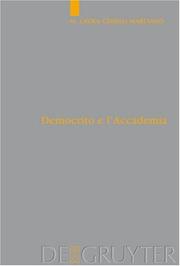| Listing 1 - 2 of 2 |
Sort by
|
Book
ISBN: 1282400649 9786612400643 9047425642 9789047425649 9789004172173 9004172173 9781282400641 6612400641 Year: 2009 Volume: 9 8 Publisher: Leiden Boston Brill
Abstract | Keywords | Export | Availability | Bookmark
 Loading...
Loading...Choose an application
- Reference Manager
- EndNote
- RefWorks (Direct export to RefWorks)
This book is the result of a collective attempt to give a general survey of the development of atomism and its critics in the late Middle Ages. All the contributors focussed on the thirteenth and fourteenth centuries atomists and anti-atomists, with a thorough examination of some important figures, as Nicholas of Autrecourt or John Wyclif, and lesser known as Gerard of Odo or William Crathorn for example. From those essays on particular authors a new way of understanding the discussions of atomism in late medieval philosophy and theology emerges. This volume demonstrates the existence of strong and complicated connections between natural philosophy, mathematics and theology in the medieval discussions of the atomistic hypothesis. All chapters present a new research that will be of interest to historians of medieval philosophy, science and theology. Contributors include: Joël Biard, Sander W. de Boer, Jean Celeyrette, Christophe Grellard, Elżbieta Jung, Emily Michael, John E. Murdoch, Robert Podkoński, Aurélien Robert, and Rega Wood. Medieval and Early Modern Science , 9
Atomism. --- Philosophy, Medieval. --- Medieval philosophy --- Scholasticism --- Atomic theory --- Philosophy --- Philosophy, Ancient --- Pluralism --- Atomism --- Philosophy, Medieval --- Atomisme --- Philosophie médiévale

ISBN: 9783110185423 3110912724 3110185423 9783110912722 Year: 2007 Volume: Bd. 1 Publisher: Berlin New York De Gruyter
Abstract | Keywords | Export | Availability | Bookmark
 Loading...
Loading...Choose an application
- Reference Manager
- EndNote
- RefWorks (Direct export to RefWorks)
How did the Ancient Greek Atomists come to assume the existence of atoms, and how did they understand their indivisibility? These are the most difficult questions facing researchers into Atomism in Classical Antiquity, and it is these questions that Laura Gemelli addresses in the present study. She re-examines the Ancients' tradition from a new perspective, starting from the influence that academic atomism and the attendant problems and concepts had on Aristotle's interpretation of ancient Atomism.This hitherto neglected perspective leads to a critical revision of generally accepted theses such as the origins of Atomism in Eleatism and the postulation of the atom as a solution to the aporias of infinite divisibility. The author then follows the further development of the views of Atomism put forward by Aristotle and Theophrastus as far as the Neo-Platonists. This book provides the foundations for a re-evaluation of the sources and a shift in perspective for research into the Ancient Atomists. Wie sind die antiken Atomisten zur Annahme der Atome gekommen, und wie haben sie deren Unteilbarkeit aufgefasst? Dies sind die schwierigsten Fragen in der Forschung zum antiken Atomismus, und ihnen widmet sich Laura Gemelli in der vorliegenden Studie. Sie überprüft die antike Überlieferung unter einem neuen Gesichtspunkt: nämlich ausgehend von dem Einfluss, den der akademische Atomismus und die damit verbundenen Problemstellungen und Begriffe auf die Interpretation des antiken Atomismus bei Aristoteles hatten. Diese bisher vernachlässigte Perspektive führt zur kritischen Revision allgemein akzeptierter Thesen wie der Entstehung des Atomismus aus dem Eleatismus und der Annahme des Atoms als Lösung der Aporien über die unendliche Teilbarkeit. Die von Aristoteles und von Theophrast ausgehenden Auffassungen des Atomismus werden dann in ihrer weiteren Entwicklung bis zum Neuplatonismus verfolgt. Das Buch schafft die Grundlagen für eine Neubewertung der Quellen und für eine Verschiebung der Perspektive in der Forschung zum antiken Atomismus.
182.7 --- 185 --- Philosophy & psychology Pre-Socratic Greek Democritean philosophy --- Philosophy & psychology Aristotelian --- Atomism -- History. --- Democritus, ca. 460-ca. 370 B.C. --- Atomism --- Democritus, --- Democrit, --- Démocrite, --- Democrito, --- Demokrit, --- Dēmokritos, --- Demokryt, --- Demokʻŭritʻosŭ, --- Dīmūqrīṭis, --- Temokʻŭritʻosŭ, --- Δημόκριτος, --- Pre-Socratic philosophers. --- Philosophy, Ancient. --- Ancient philosophy --- Greek philosophy --- Philosophy, Greek --- Philosophy, Roman --- Roman philosophy --- Pre-Socratics --- Presocratic philosophers --- Presocratics --- Philosophers --- Atomic theory --- Philosophy --- Philosophy, Ancient --- Pluralism --- History. --- Atomisme. --- Démocrite --- Critique et interprétation. --- Démocrite --- Pre-Socratic philosophers --- History --- Ancient Philosophy. --- Atomism.
| Listing 1 - 2 of 2 |
Sort by
|

 Search
Search Feedback
Feedback About UniCat
About UniCat  Help
Help News
News